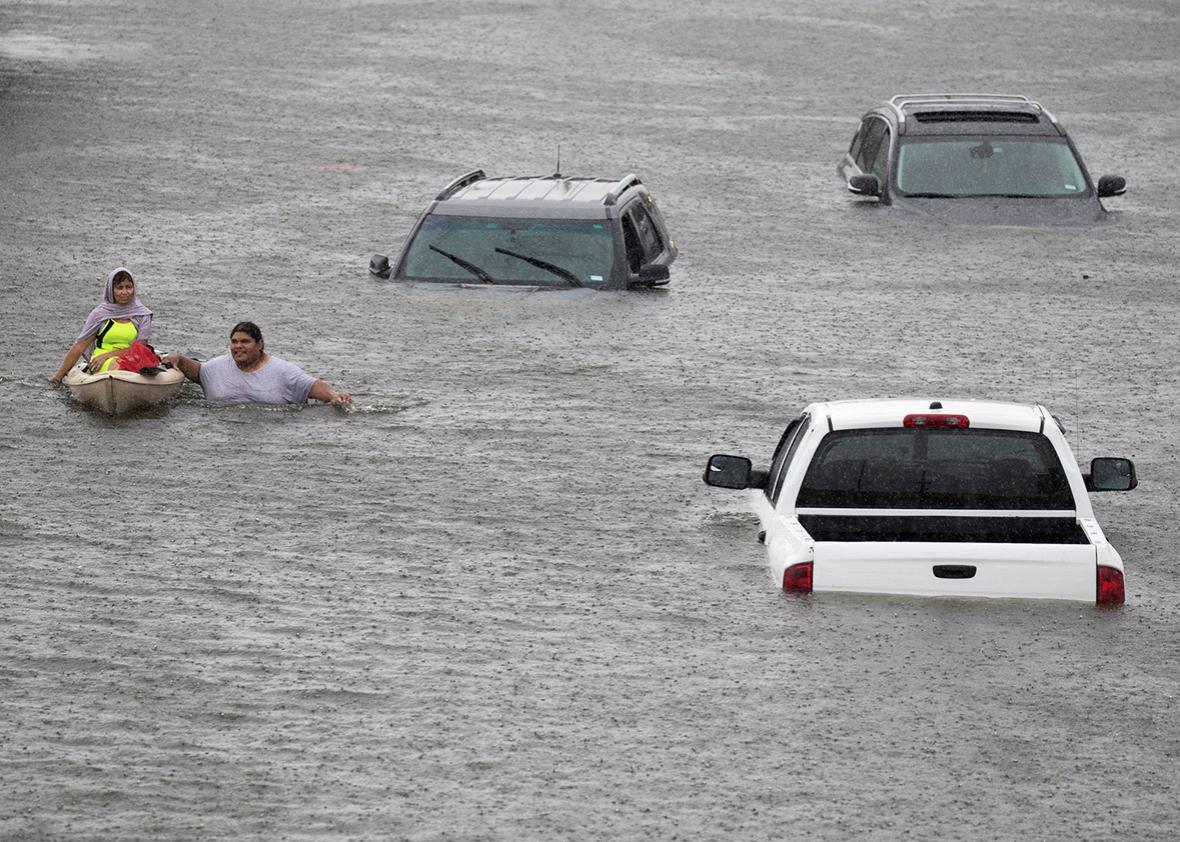The scenes from Hurricane Harvey, of flooded Houston streets and freeways turned to rivers, are a level of calamity that’s hard to imagine. We don’t yet know the full weight of the disaster in lives lost or property destroyed, but it’s clear we face a long project of reconstruction and rebuilding. This doesn’t just pose a general problem for Congress, now responsible for funding recovery efforts, or the White House, which has to direct them. It poses a particular problem for the Republican Party, where anti-government and anti-tax ideology must contend with the needs of managing an outright environmental catastrophe.
We know what this might look like from past disasters. Following Hurricane Katrina in 2005, conservative members of Congress were reluctant to authorize funding for recovery efforts without corresponding budget cuts. “Congress will continue the work of funding relief and recovery from Hurricane Katrina. And well we should, by speeding more than $50 billion to FEMA and other agencies,” said then-Rep. Mike Pence to his colleagues in the House of Representatives. But he added, “Let’s figure out how we’re going to pay for it. Congress must ensure that a catastrophe of nature does not become a catastrophe of debt for our children and grandchildren.”
If the sentiment manages to sound reasonable on its face—money in, money out—another way to look at it is conditional mercy. In the wake of Superstorm Sandy, which devastated parts of New York and New Jersey just before the 2012 presidential election, House conservatives launched a major effort to tie relief to large across-the-board cuts in domestic spending totaling $17 billion. Two-thirds of House Republicans backed an amendment to do just that, including now-Speaker Paul Ryan and a host of other high-ranking Republican lawmakers. The amendment failed, but the majority of Republicans in both chambers—including Texas Sens. John Cornyn and Ted Cruz—voted against the $50 billion aid package for Sandy and blasted Democrats for packing it with unneeded “pork.” (This was bogus; virtually every provision in the bill was related to hurricane damage and recovery.) Now, both lawmakers—along with most of the Texas Republican delegation that opposed the Sandy package—support federal aid for Hurricane Harvey relief.
(The changed tune has not gone unnoticed: Outgoing New Jersey Gov. Chris Christie has blasted Republicans, saying, “I have no sympathy for this—and I see Sen. Cruz and it’s disgusting to me that he stands in a recovery center with victims standing behind him as a backdrop.”)
In 2015, massive rains caused historic floods in parts of coastal South Carolina, overwhelming its resources. The state’s congressional delegation, including Sens. Tim Scott and Lindsey Graham, vowed to find federal aid for the recovery. Two years earlier, however, Scott and Graham voted against aid for Sandy. As did Mick Mulvaney, then a representative from South Carolina, who introduced the aforementioned amendment to offset Sandy aid with domestic spending cuts. “I wish very much that we could pass this and easily borrow the money without any questions whatsoever, but we’ve wasted that opportunity,” said Mulvaney at the time. “We’ve mismanaged our own finances to the point where we are now no longer capable of taking care of our own.”
This is obvious hypocrisy from Republicans, who oppose disaster spending for other states and citizens, but support it when it benefits their own. (We don’t see this with Democrats, who back relief regardless of circumstances.) Politically, it’s unsurprising. But the worse crime here is to demand spending cuts in exchange for support as Republicans did for Katrina and Sandy. Doing so is to attack the foundation of the social safety net: to say that help is the exception—not the norm—and that communities will pay through other means if they can’t bear the cost of disasters. And the related stance—help for some but not others—flows naturally from a conservative ideology that disdains universal public goods, seeks to reify the advantages of privilege and accumulated wealth, and frequently equates help with handouts. The impulse to craft a health care bill that cuts benefits for the poor to fund taxes for the rich isn’t distant from the one that finds conditions and strings when distant states need relief but demands unqualified help when disaster strikes at home.
There’s a chance that this predictable outcome of conservative Republican ideology will complicate efforts at relief for Hurricane Harvey. The Freedom Caucus—a hard-right faction of House Republicans—has said it is prepared to fight over the debt ceiling in the next month, even if that fight precludes Congress from passing that relief. Then again, the leader of the Freedom Caucus, North Carolina Rep. Mark Meadows, has also said that he won’t demand budget cuts for hurricane relief. “As we look at helping our neighbors in Texas, our hearts can’t avoid being touched by the devastation we see,” he said. Meadows, like many of his colleagues, voted against aid for Sandy.
Texas will likely get the money it needs, although there’s still the challenge of managing the response and the recovery—a challenge which requires a level of engagement and care we have yet to see from either Congress or the White House. But this about-face is striking. Yes there is hypocrisy and ideology at work, but there seems to be something even more elemental, a disdain for government assistance so instinctive that it’s only mitigated when the need hits close to home. Even then—as evident from Cruz and Meadows—there’s no attempt to obscure the flip-flop. The lawmakers don’t seem to care that it is inconsistent. That might even be the point.
